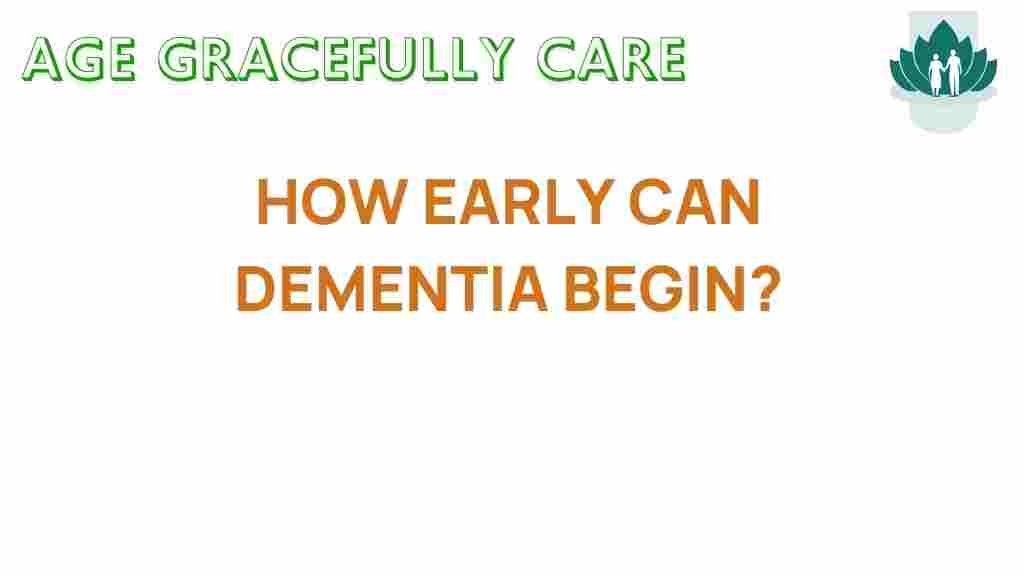Unraveling the Mystery: How Early Can Dementia Begin?
Dementia is a term that encompasses various cognitive impairments that interfere with daily living. While many associate dementia with advanced aging, research shows that the early signs of cognitive decline may occur much earlier than we realize. Understanding the onset of dementia is crucial for early detection, intervention, and improving brain health. In this article, we will delve into the early signs of dementia, the factors that contribute to cognitive decline, and strategies for prevention.
Understanding Dementia
Dementia is not a specific disease; rather, it is an umbrella term for a range of conditions characterized by cognitive dysfunction. The most common type is Alzheimer’s disease, which accounts for 60-80% of dementia cases. Other types include vascular dementia, Lewy body dementia, and frontotemporal dementia. Each type has unique symptoms and trajectories, but all can lead to significant memory loss and cognitive decline.
The Early Signs of Dementia
Recognizing the early signs of dementia can lead to timely diagnosis and treatment. Some common early signs include:
- Memory Loss: Frequently forgetting recent conversations, appointments, or events.
- Difficulty with Problem Solving: Struggling to plan or solve simple problems, such as following a recipe.
- Confusion with Time or Place: Losing track of dates, seasons, or the passage of time.
- Challenges in Communication: Difficulty finding the right words or following conversations.
- Withdrawal from Social Activities: Avoiding social engagements or hobbies that were once enjoyable.
If you notice these symptoms in yourself or a loved one, it is essential to consult a healthcare professional for further evaluation.
When Does Cognitive Decline Begin?
Cognitive decline can begin as early as the 30s or 40s, although it often goes unnoticed at this stage. Studies suggest that changes in the brain associated with Alzheimer’s disease can start two decades before symptoms become evident. This underscores the importance of understanding the risk factors and implementing preventive measures early on.
Risk Factors for Dementia
Several risk factors can increase the likelihood of developing dementia, including:
- Aging: Age is the most significant risk factor for dementia. The risk doubles every five years after age 65.
- Genetics: Family history can play a critical role, particularly for Alzheimer’s disease.
- Cardiovascular Health: Conditions such as hypertension, diabetes, and high cholesterol can contribute to cognitive decline.
- Lifestyle Factors: Smoking, excessive alcohol consumption, and a sedentary lifestyle can increase the risk.
- Brain Injuries: Traumatic brain injuries have been linked to a higher risk of developing dementia later in life.
Understanding these risk factors can empower individuals to take control of their brain health.
Promoting Brain Health: Prevention Strategies
While some risk factors cannot be changed, many lifestyle choices can significantly impact brain health and potentially delay or prevent cognitive decline. Here are some effective strategies:
- Maintain a Healthy Diet: A diet rich in fruits, vegetables, whole grains, and healthy fats (like the Mediterranean diet) can support brain health.
- Stay Physically Active: Regular exercise increases blood flow to the brain and promotes cognitive function.
- Engage in Mental Stimulation: Activities like puzzles, reading, and learning new skills can help maintain cognitive abilities.
- Social Engagement: Staying socially active can reduce feelings of isolation and improve mental well-being.
- Manage Stress: Practices such as mindfulness, meditation, and yoga can support mental health.
For more detailed strategies on maintaining brain health, visit the Alzheimer’s Association.
Step-by-Step Process for Monitoring Brain Health
To effectively monitor and promote brain health, consider the following steps:
- Track Changes: Keep a journal to note any changes in memory, mood, or cognitive function.
- Consult a Doctor: Schedule regular check-ups and discuss any concerns regarding cognitive decline.
- Engage in Healthy Habits: Incorporate the prevention strategies mentioned earlier into daily life.
- Stay Informed: Educate yourself about dementia and the latest research to stay proactive.
- Support Networks: Connect with support groups or communities to share experiences and resources.
Troubleshooting Tips for Identifying Early Signs
If you or someone you know is experiencing potential early signs of dementia, here are some troubleshooting tips:
- Look for Patterns: Identify if memory loss occurs consistently or only occasionally.
- Consider Other Causes: Assess whether the symptoms may be attributed to stress, depression, or other medical conditions.
- Engage Family Members: Discuss observations with family members to gain different perspectives.
- Seek Professional Evaluation: If symptoms persist, contact a healthcare professional for a comprehensive assessment.
Conclusion
Understanding how early dementia can begin is vital for early detection and intervention. Recognizing the early signs of cognitive decline, being aware of risk factors, and implementing preventive strategies can significantly impact brain health as we age. By fostering a proactive approach to cognitive health, individuals can take meaningful steps to enhance their quality of life and potentially delay the onset of dementia.
As we continue to unravel the mysteries surrounding dementia, it becomes increasingly clear that early awareness and action can make all the difference. For those interested in learning more about brain health and cognitive decline, consider visiting resources such as the National Institute on Aging.
This article is in the category Health and created by AgeGracefullyCare Team
